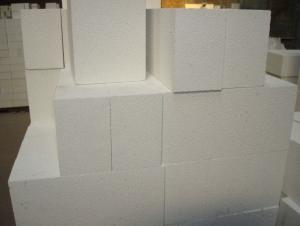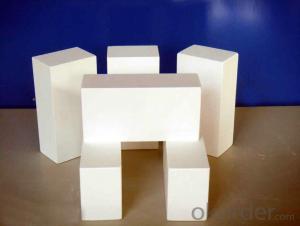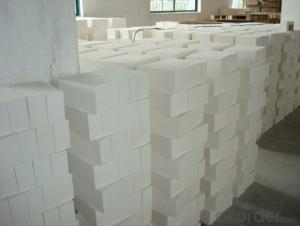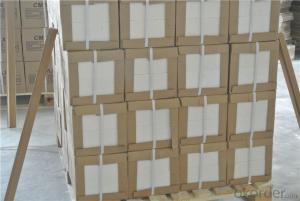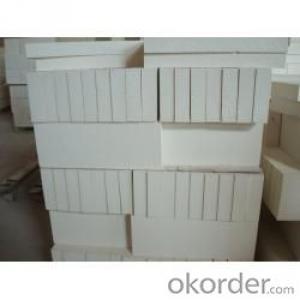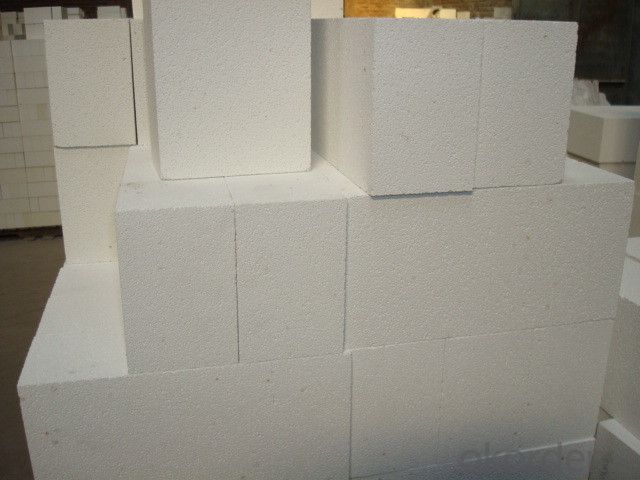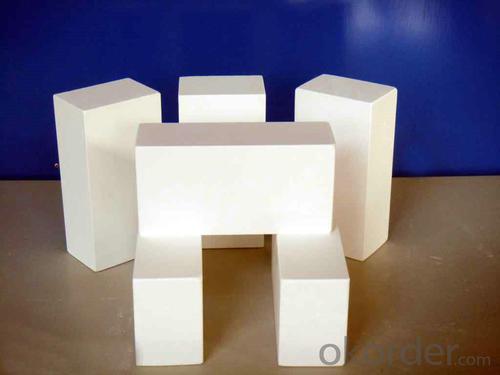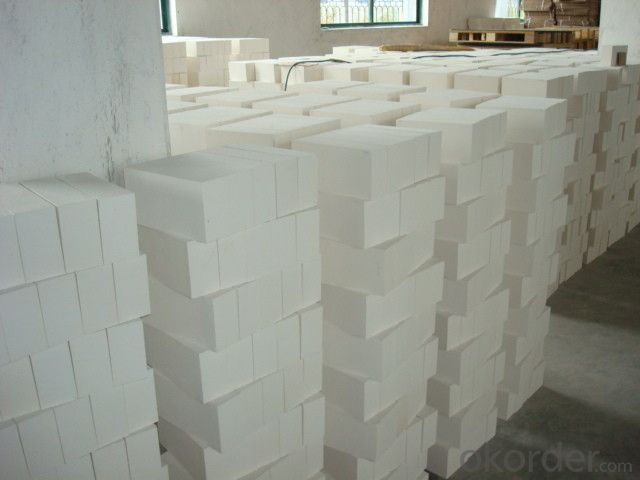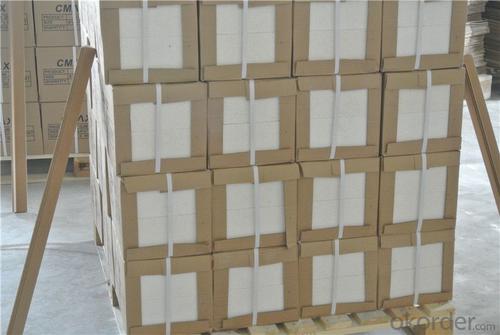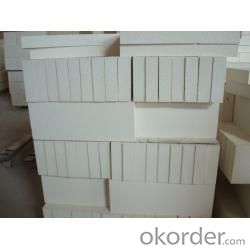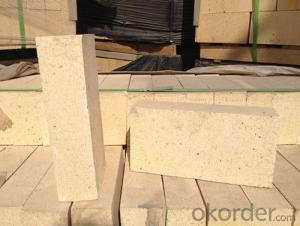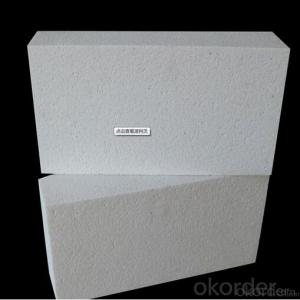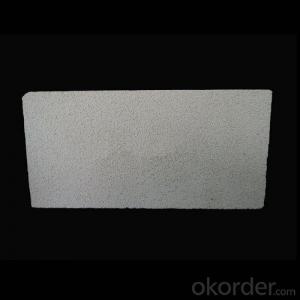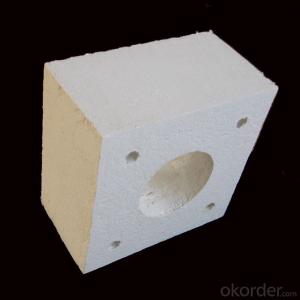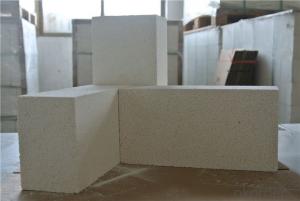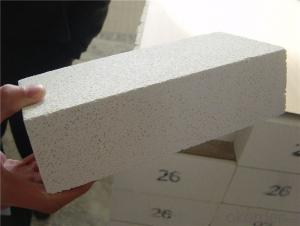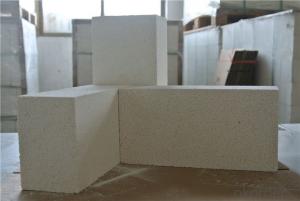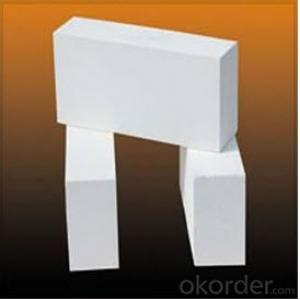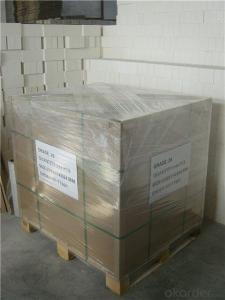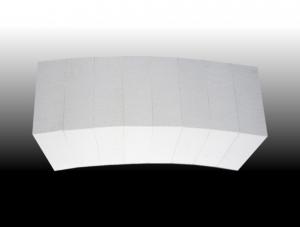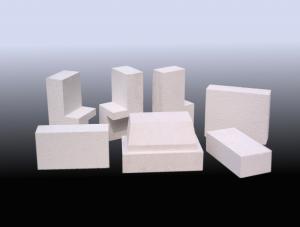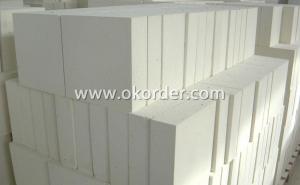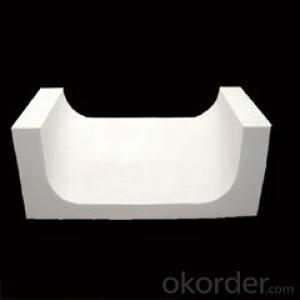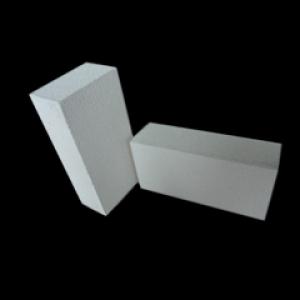Insulating Fire Brick - Lightweight Insulation Refractory Clay for Industrial Furnaces
- Loading Port:
- Shanghai
- Payment Terms:
- TT OR LC
- Min Order Qty:
- 1 m.t.
- Supply Capability:
- 1000 m.t./month
OKorder Service Pledge
OKorder Financial Service
You Might Also Like
Thermal Insulation Fire Clay Brick
Refractory brick is a block of refractory ceramic material used in lining furnaces, kilns, fireboxes, and fireplaces.
We provide high quality Refractory Fire Bricks that are used on wide range in the various industries like Cement, Glass and Steel. Refractory Fire Bricks are provided as per the quantity and specifications required by the customers. We provide an extensive range of Refractory Fire Bricks at reasonable prices that depend upon the quantity ordered.
Application
Insulating Fire Brick are used for the lining of converter, alternating current arc furnace, direct Current arc furnace and the ladle slag line, etc.
Company Advantage
(1)Long Insulating Fire Brick manufacture history: 25 years manufacturer
(2)Advanced equipment
(3)Diversification of production standards: ISO ANSI FEPA JIS ASTM
(4)Flexible payment: T/T L/C D/P D/A
(5)Professional marketing team and after-sale service
Insulating Fire Brick main feature:
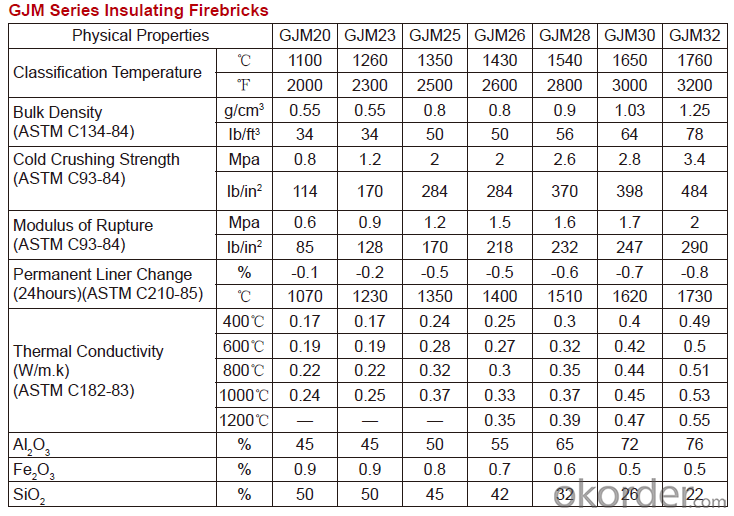
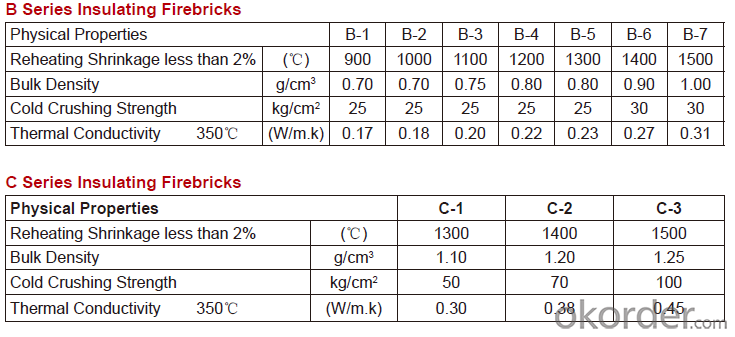
Equipment
1 unit of Ceramic Abrasive (SG Abrasive) pilot production line
2 units of Compact grain Abrasive pilot production lines
1 unit of high-end coated abrasives (abrasive cloth) production line
2 units of Boron Carbide production lines
3 large flexible crushing and sieving lines for grit production lines
6 units of 5000KVA-10000KVA dumping type electric arc furnaces for Brown Fused Alumina fusion
Q1 What’s the transport method?
A1 FCL delivery goods with wooden pallet or wooden case by sea; If LCL delivery, must with wooden case; Sometimes need open top, flat rack or bulk cargo.
Q2 What’s the required payment term?
A2 Generally 30% TT as the prepayment, 70% TT before delivery. If need, 100% Irrevocable Letter of Credit or negotiation.
Q3 Which country are our products exported to?
A3 Apart from entire Chinese market, the US, Russia, Japan, Korea, Australia and some Southeast Asian Nations.
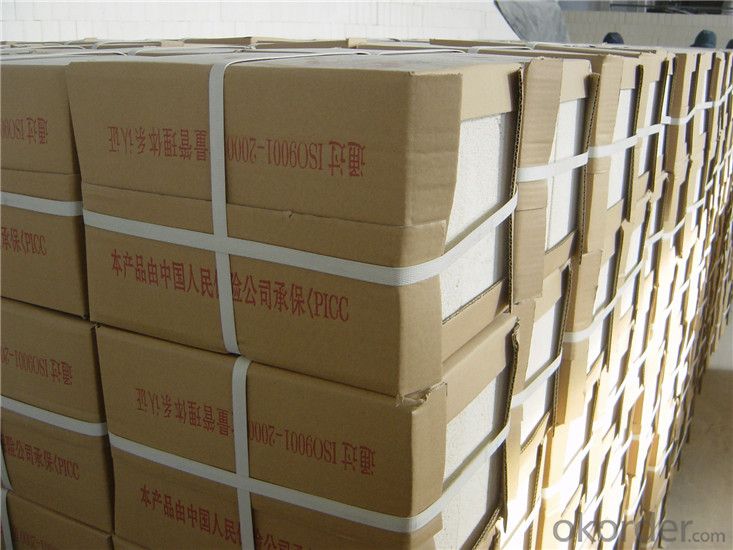
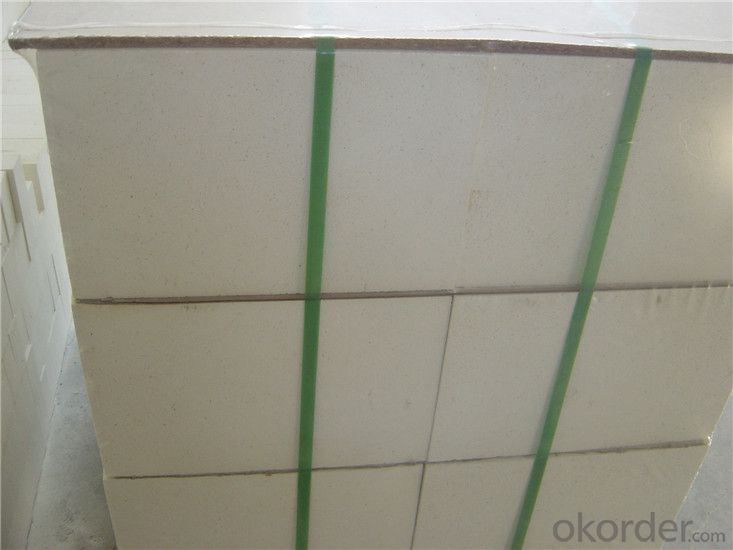
- Q: Can insulating fire bricks be used in copper smelting furnaces?
- In the realm of copper smelting furnaces, the utilization of insulating fire bricks is indeed possible. These fire bricks have been specifically engineered to endure high temperatures and offer remarkable insulation, rendering them an ideal choice for furnace usage. Composed of materials capable of withstanding the intense heat generated during the smelting process, these bricks are proficient in both retaining and reflecting heat back into the furnace. This aids in the maintenance of the desired temperature and enhances energy efficiency. Moreover, the inclusion of insulating fire bricks can curtail heat loss, thereby resulting in swifter and more efficient copper smelting. For this reason, the incorporation of insulating fire bricks into copper smelting furnaces has become a widespread practice within the industry.
- Q: Can insulating fire bricks be used in residential fireplaces?
- Residential fireplaces can indeed utilize insulating fire bricks. These specialized bricks are engineered to endure extreme temperatures while providing exceptional insulation, rendering them an apt option for constructing fireplaces. These bricks have the ability to retain heat, boost energy efficiency, and prevent heat loss. Moreover, they offer superior defense against thermal shock, a crucial element for enduring the intense heat produced by a fireplace. Furthermore, insulating fire bricks are lightweight, easy to manipulate, and can be effortlessly shaped or trimmed to fit any fireplace design or size. All in all, incorporating insulating fire bricks into residential fireplaces is a prudent decision for homeowners seeking to enhance their fireplace's performance and safety.
- Q: Are insulating fire bricks resistant to thermal conductivity?
- Yes, insulating fire bricks are designed to be resistant to thermal conductivity. These bricks are made from materials with low thermal conductivity, such as lightweight refractory fibers or insulating materials like vermiculite or perlite. The purpose of insulating fire bricks is to provide thermal insulation and prevent heat transfer, making them ideal for applications where temperature control is important, such as in kilns, furnaces, or fireplaces. By reducing thermal conductivity, insulating fire bricks help to retain heat within the desired area and minimize energy loss, making them an effective choice for insulation in high-temperature environments.
- Q: Can insulating fire bricks be used in drying ovens?
- Yes, insulating fire bricks can be used in drying ovens. These bricks are designed to withstand high temperatures and provide insulation, making them suitable for use in ovens where drying processes occur. They help to maintain a consistent and efficient heat distribution, ensuring effective drying of the materials inside the oven.
- Q: Can insulating fire bricks be used in metal melting furnaces?
- Indeed, metal melting furnaces can utilize insulating fire bricks. Specifically tailored to endure high temperatures and offer exceptional insulation, these bricks prove to be an optimal selection for applications such as metal melting furnaces. These bricks possess a low thermal conductivity, which aids in heat preservation and diminishes energy usage. Furthermore, insulating fire bricks are lightweight, long-lasting, and capable of withstanding thermal shock, rendering them a fitting choice for the severe conditions experienced in metal melting furnaces.
- Q: Can insulating fire bricks be used in the construction of furnaces?
- Insulating fire bricks are indeed suitable for the construction of furnaces. These bricks possess exceptional insulation qualities, enabling them to endure high temperatures without significant heat loss. Their composition primarily consists of lightweight materials like clay, silica, and alumina. Consequently, they exhibit low thermal conductivity, allowing the furnace to retain heat efficiently while preventing excessive heating of its outer surface. As a result, these bricks are ideal for lining the walls, roof, and floor of furnaces, contributing to enhanced energy efficiency and reduced fuel consumption. Moreover, their resistance to thermal shock ensures their durability and longevity in the demanding conditions of a furnace. In conclusion, considering their exceptional insulation properties and capacity to withstand high temperatures, insulating fire bricks remain a preferred option for furnace construction.
- Q: Are insulating fire bricks resistant to salt attack?
- Yes, insulating fire bricks are generally resistant to salt attack. They have a high resistance to chemical reactions and can withstand exposure to salts without significant deterioration.
- Q: Do insulating fire bricks have a high thermal shock resistance?
- Insulating fire bricks are commonly known for their remarkable thermal shock resistance. They are specifically engineered to endure sudden temperature variations without any fractures or damage. Crafted from lightweight refractory materials with low thermal conductivity, these bricks effectively reduce heat transfer and prevent thermal strain. Furthermore, the firing process they undergo further enhances their ability to withstand thermal shocks. In summary, these bricks are perfect for situations where extreme temperature fluctuations are encountered, making them a dependable option for insulation in high-temperature surroundings.
- Q: Can insulating fire bricks be used in high-temperature ducts?
- Yes, insulating fire bricks can be used in high-temperature ducts. Insulating fire bricks are designed to withstand high temperatures and provide thermal insulation, making them suitable for use in ducts where high temperatures are present.
- Q: Are insulating fire bricks suitable for use in lime kilns?
- Yes, insulating fire bricks are suitable for use in lime kilns. They have high insulating properties that help to maintain high temperatures inside the kiln while minimizing heat loss. This is important for efficient lime production. Additionally, insulating fire bricks are resistant to the corrosive nature of lime, making them a durable and reliable choice for lime kilns.
Send your message to us
Insulating Fire Brick - Lightweight Insulation Refractory Clay for Industrial Furnaces
- Loading Port:
- Shanghai
- Payment Terms:
- TT OR LC
- Min Order Qty:
- 1 m.t.
- Supply Capability:
- 1000 m.t./month
OKorder Service Pledge
OKorder Financial Service
Similar products
Hot products
Hot Searches
Related keywords
